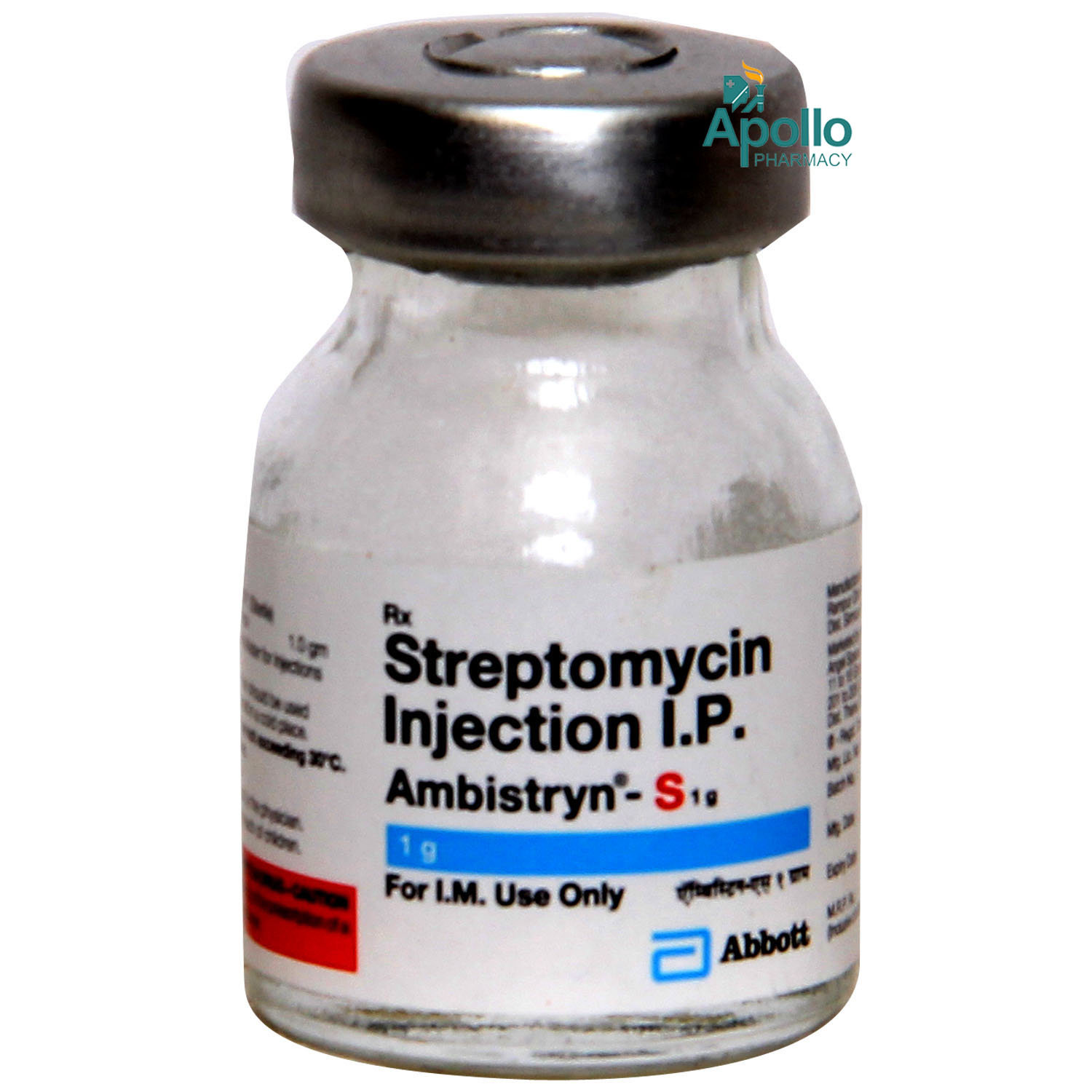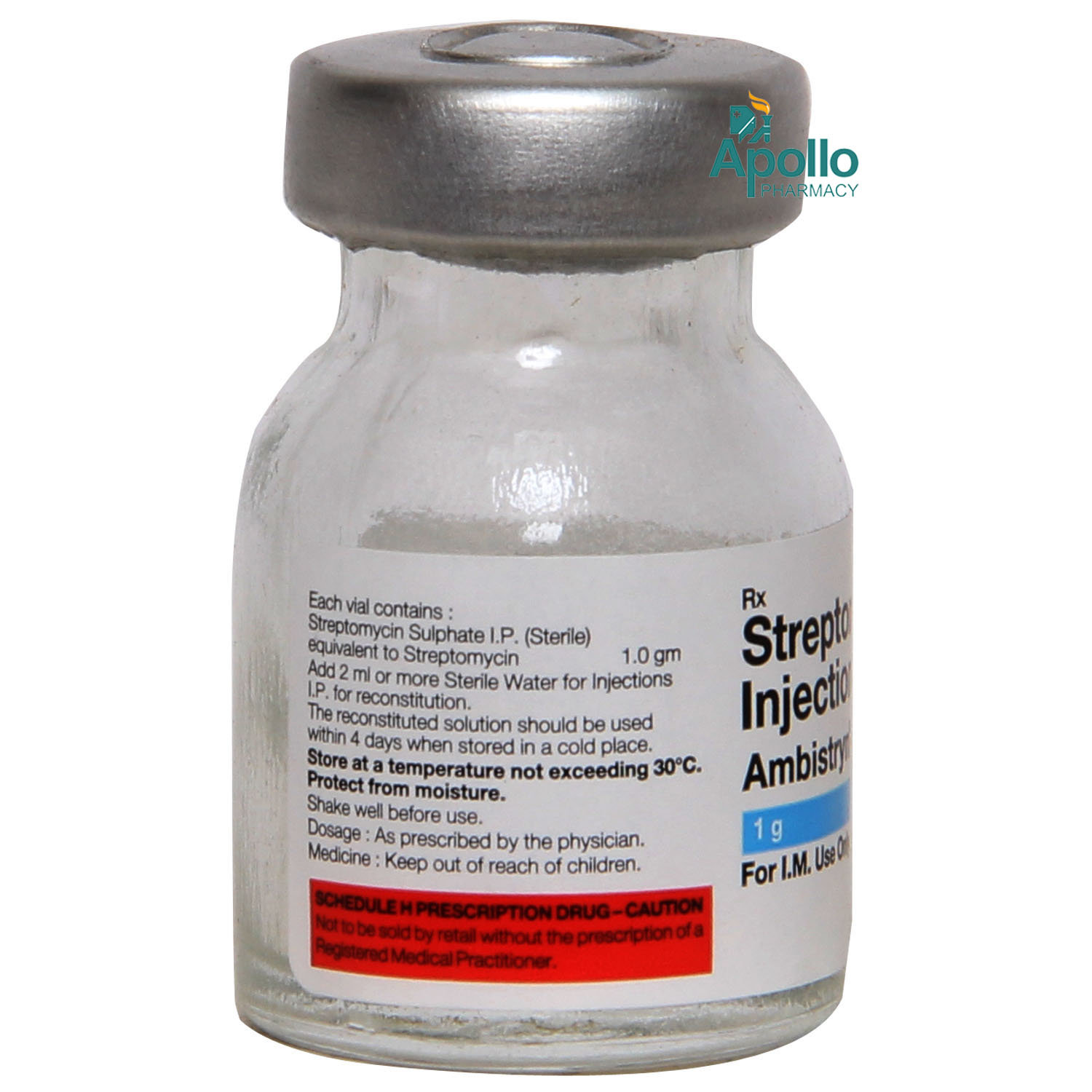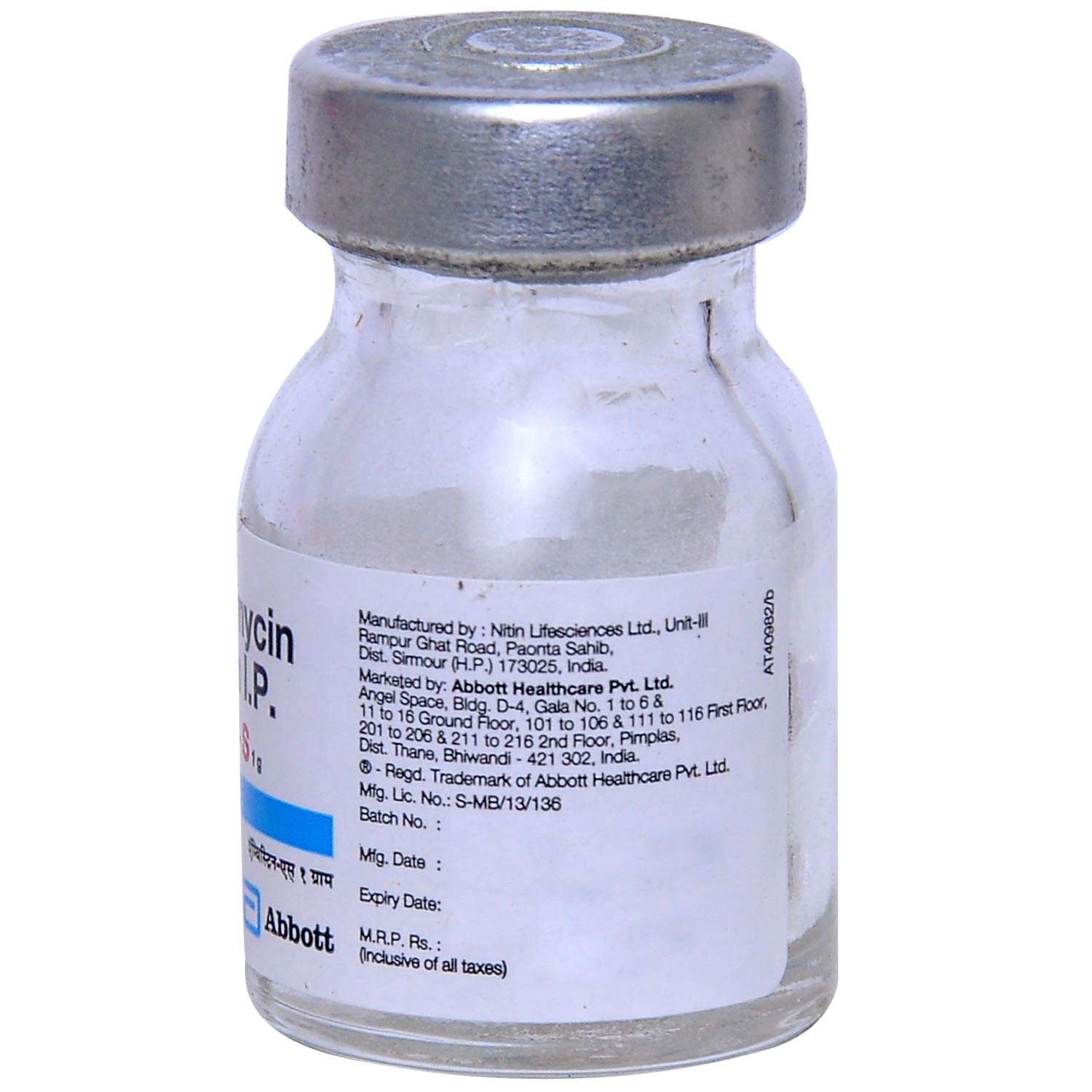Ambistryn S 1gm Injection 1's
MRP ₹17
(Inclusive of all Taxes)
₹2.5 Cashback (15%)
Provide Delivery Location
Online payment accepted
 Prescription drug
Prescription drugWhats That
Composition :
Manufacturer/Marketer :
Consume Type :
Expires on or after :
Return Policy :
About Ambistryn S 1gm Injection
Ambistryn S 1gm Injection belongs to the group of medicines called 'anti-tuberculosis', primarily used to treat and prevent bacterial infections like tuberculosis (TB), pneumonia, influenza, plague and other infections. Tuberculosis is an infectious bacterial disease that mainly affects the lungs but can also spread to other body parts such as the kidneys, brain, spine, and bone marrow. Ambistryn S 1gm Injection does not work against infections caused by the virus.
Ambistryn S 1gm Injection contains Streptomycin, an antibiotic that prevents the production of an enzyme known as mycolic acids by bacteria essential for cell wall formation (protective coating). Thereby, bacteria get killed without a cell wall and burst due to disruption in their metabolism. Thus, Ambistryn S 1gm Injection is effective against Mycobacterium tuberculosis, which causes TB (tuberculosis) and prevents further infection.
Take Ambistryn S 1gm Injection as prescribed by your doctor. You are advised to use Ambistryn S 1gm Injection for as long as your doctor has prescribed it based on your medical condition. Sometimes, you may experience a skin rash, vomiting, nausea, vertigo, fever and dizziness. Most of these side effects of Ambistryn S 1gm Injection do not require medical attention and gradually resolve over time. However, if the side effects persist or worsen, please consult your doctor.
Inform your doctor if you are allergic to Ambistryn S 1gm Injection or other medicines. Disclose your doctor before taking Ambistryn S 1gm Injection if you are pregnant or breastfeeding. Ambistryn S 1gm Injection may cause nerve problems, fits or optic neuritis (swelling of the optic nerve that may cause vision loss) in some people. Therefore, avoid driving if you experience these symptoms after taking Ambistryn S 1gm Injection. If you have diabetes, dehydration, kidney or liver problems, or have suffered from psychosis (mental disturbances), inform your doctor before taking Ambistryn S 1gm Injection.
Uses of Ambistryn S 1gm Injection
Directions for Use
Key Benefits
Ambistryn S 1gm Injection contains Streptomycin, primarily used to treat and prevent bacterial infections like tuberculosis (TB), pneumonia, influenza and plague. It is an antibiotic that prevents the production of an enzyme known as mycolic acids by bacteria essential for cell wall formation (protective coating). Thereby, bacteria get killed without a cell wall and burst due to disruption in their metabolism. Thus, Ambistryn S 1gm Injection acts against a bacteria named Mycobacterium tuberculosis, which causes TB (tuberculosis), and prevents further infection.
Storage
- Inform your doctor immediately if you experience a fever after starting a new medication.
- Your doctor may adjust your medication regimen or dosage as needed to minimize fever symptoms.
- Monitor your body temperature to monitor fever progression.
- Drink plenty of fluids, such as water or electrolyte-rich beverages, to help your body regulate temperature.
- Get plenty of rest and engage in relaxation techniques, such as deep breathing or meditation, to help manage fever symptoms.
- Under the guidance of your doctor, consider taking medication, such as acetaminophen or ibuprofen, to help reduce fever.
- If your fever is extremely high (over 103°F), or if you experience severe symptoms such as confusion, seizures, or difficulty breathing, seek immediate medical attention.
- Inform your doctor about the nausea and discuss possible alternatives to the medication or adjustments to the dosage.
- Divide your daily food intake into smaller, more frequent meals to reduce nausea.
- Opt for bland, easily digestible foods like crackers, toast, plain rice, bananas, and applesauce.
- Avoid certain foods that can trigger nausea, such as fatty, greasy, spicy, and smelly foods.
- Drink plenty of fluids, such as water, clear broth, or electrolyte-rich beverages like coconut water or sports drinks.
- Use ginger (tea, ale, or candies) to help relieve nausea.
- Get adequate rest and also avoid strenuous activities that can worsen nausea.
- Talk to your doctor about taking anti-nausea medication if your nausea is severe.
- Record when your nausea occurs, what triggers it, and what provides relief to help you identify patterns and manage your symptoms more effectively.
- Preventing Vomiting (Before it Happens)
- Take medication exactly as prescribed by your doctor. This can help minimize side effects, including vomiting.
- Having a small meal before taking your medication can help reduce nausea and vomiting.
- Talk to your doctor about taking anti-nausea medication along with your prescribed medication.
- Managing Vomiting (If it Happens)
- Try taking ginger in the form of tea, ale, or candy to help alleviate nausea and vomiting.
- What to Do if Vomiting Persists
- Consult your doctor if vomiting continues or worsens, consult the doctor for guidance on adjusting your medication or additional treatment.
- Eosinophil levels can be lowered by eating fruits and vegetables, avoiding smoking, and consuming alcohol in moderation.
- Several foods, such as ginger, garlic, pepper, turmeric, and honey, might boost immunity.
- Avoid dairy products, including cheese, yoghurt, and milk.
- Drink water and keep yourself hydrated.
- Inform your doctor about dizziness symptoms. They may adjust your medication regimen or prescribe additional medications to manage symptoms.
- Follow your doctor's instructions for taking medication, and take it at the same time every day to minimize dizziness.
- When standing up, do so slowly and carefully to avoid sudden dizziness.
- Avoid making sudden movements, such as turning or bending quickly, which can exacerbate dizziness.
- Drink plenty of water throughout the day to stay hydrated and help alleviate dizziness symptoms.
- If you're feeling dizzy, sit or lie down and rest until the dizziness passes.
- Track when dizziness occurs and any factors that may trigger it, and share this information with your doctor to help manage symptoms.
Drug Warnings
If you are known to be allergic to Ambistryn S 1gm Injection or any other medicines, please tell your doctor. If pregnant or breastfeeding, please inform your doctor before taking the Ambistryn S 1gm Injection. Ambistryn S 1gm Injection may cause mental health problems, fits or optic neuritis (swelling of the optic nerve that may cause vision loss) in some people. Therefore, avoid driving if you experience these symptoms after taking Ambistryn S 1gm Injection. If you have fits, diabetes, HIV infection, malnutrition, kidney or liver problems or have suffered from psychosis (mental disturbances), inform your doctor before taking Ambistryn S 1gm Injection. You must regularly undergo blood, urine and hearing tests while taking Ambistryn S 1gm Injection.
Drug-Drug Interactions
Drug-Drug Interactions
Login/Sign Up
Using cidofovir with Ambistryn S 1gm Injection can increase the risk or severity of kidney problems.
How to manage the interaction:
Taking Ambistryn S 1gm Injection with Cidofovir is not recommended, please consult your doctor before taking it. If you experience nausea, vomiting, loss of hunger, increased or decreased urination, sudden weight gain or weight loss, fluid retention, swelling, shortness of breath, bone pain, muscle cramps, tiredness, weakness, dizziness, confusion, irregular heart rhythm. Do not discontinue any medication without consulting a doctor.
Co-administration of Ambistryn S 1gm Injection with Tubocurarine may increase the risk or severity of side effects.
How to manage the interaction:
There may be a possibility of interaction between Ambistryn S 1gm Injection and Tubocurarine, but it can be taken if prescribed by a doctor. However, if you experience sudden dizziness, lightheadedness, fainting, shortness of breath, chest pain or tightness, rapid heartbeat, or increased heart rate, contact your doctor immediately. Do not discontinue any medications without consulting a doctor.
Co-administration of Human immunoglobulin with Ambistryn S 1gm Injection can increase the risk or severity of kidney problems.
How to manage the interaction:
Co-administration of Human immunoglobulin with Ambistryn S 1gm Injection can result in an interaction, but it can be taken if a doctor has advised it. However, if you experience nausea, vomiting, loss of appetite, increased or decreased urination, sudden weight gain or loss, fluid retention, swelling, shortness of breath, muscle cramps, tiredness, weakness, dizziness, confusion, or an irregular heart rhythm, consult a doctor. Do not discontinue any medications without consulting a doctor.
Co-administration of Ambistryn S 1gm Injection with Bumetanide can increase the levels and side effects of Ambistryn S 1gm Injection like hearing loss, ringing in the ears, vertigo, and kidney problems.
How to manage the interaction:
Co-administration of Ambistryn S 1gm Injection with Bumetanide can possibly result in an interaction, but it can be taken if your doctor has advised it. However, if you experience blurred vision, ringing in the ears, muscle cramps, loss of appetite, swelling via feet and ankles, dry, itchy skin, shortness of breath, trouble sleeping, decreased or increased urination, headaches, dizziness, nausea, vomiting, and diarrhea contact your doctor immediately. Do not stop using any medications without a doctor's advice.
Coadministration of Sirolimus with Ambistryn S 1gm Injection can increase the risk or severity of kidney problems.
How to manage the interaction:
Taking Ambistryn S 1gm Injection with Sirolimus can possibly result in an interaction, it can be taken if prescribed by your doctor. If you experience nausea, vomiting, loss of appetite, increased or decreased urination, sudden weight gain or weight loss, fluid retention, swelling, shortness of breath, bone pain, muscle cramps, tiredness, weakness, dizziness, confusion, irregular heart rhythm. Do not discontinue any medication without consulting a doctor.
Co-administration of Ambistryn S 1gm Injection with Vecuronium may increase the risk or severity of side effects.
How to manage the interaction:
Although taking Ambistryn S 1gm Injection and Vecuronium together can evidently cause an interaction, it can be taken if your doctor has suggested it. However, if you experience sudden dizziness, lightheadedness, fainting, shortness of breath, chest pain or tightness, rapid heartbeat, or irregular heart beats, contact your doctor immediately. Do not discontinue any medications without consulting a doctor.
Taking Torasemide together with Ambistryn S 1gm Injection may increase the risk or severity of kidney problems.
How to manage the interaction:
Although taking Ambistryn S 1gm Injection and torasemide together can possibly result in an interaction, it can be taken if your doctor has advised it. However, if you experience symptoms such as blurred vision, dry mouth, dry skin, frequent urination, nausea, and stomach pain, consult a doctor immediately. Do not discontinue any medications without consulting a doctor.
Co-administration of Ambistryn S 1gm Injection with Cisatracurium may increase the risk or severity of side effects like decreased breathing rate, irregular heart rhythms, or problems with movement and memory.
How to manage the interaction:
Co-administration of Ambistryn S 1gm Injection with Cisatracurium can possibly result in an interaction, but it can be taken if your doctor has advised it. However, if you experience sudden dizziness, lightheadedness, fainting, shortness of breath, chest pain or tightness, rapid heartbeat, or memory loss, contact your doctor immediately. Do not discontinue any medications without consulting a doctor.
Coadministration of Ambistryn S 1gm Injection and Tenofovir alafenamide can increase the risk of kidney problems.
How to manage the interaction:
Taking Ambistryn S 1gm Injection and Tenofovir alafenamide together can lead to an interaction, it can be taken if advised by your doctor. However, if you experience any symptoms like nausea, vomiting, loss of appetite, increased or decreased urination, sudden weight gain or weight loss, fluid retention, swelling, shortness of breath, bone pain, muscle cramps, tiredness, weakness, dizziness, confusion, and irregular heart rhythm, contact a doctor immediately. Do not discontinue any medications without consulting a doctor.
Coadministration of Deferasirox and Ambistryn S 1gm Injection can increase the risk or severity of kidney problems.
How to manage the interaction:
Although taking Deferasirox and Ambistryn S 1gm Injection together can cause an interaction, it can be taken if your doctor has suggested it. However, if you experience a fast heartbeat, anxiety, constipation, cough, dark urine, diarrhea, dizziness, lightheadedness, fainting, fever, hives or welts, itching skin or rash consult a doctor. Do not discontinue any medications without consulting a doctor.
Drug-Food Interactions
Drug-Food Interactions
Login/Sign Up
Diet & Lifestyle Advise
- Pineapple juice might help soothe the symptoms of cough and cold. It also has anti-inflammatory and mucolytic properties.
- Vitamin C-rich foods such as kiwi, broccoli, and bell pepper help improve the immune system.
- Avoid processed and fried foods.
- Warm ginger tea or warm soup can help relieve a cough.
- Avoid foods and drinks containing histamine or tyramine, such as cured meat, matured cheese, soya, tuna, salmon, mackerel, wine and beer.
- Quit smoking and avoid alcohol consumption.
Side Effects of Ambistryn S 1gm Injection
- Skin rash
- Vomiting
- Nausea
- Vertigo
- Fever
- Dizziness
Habit Forming
Therapeutic Class
All Substitutes & Brand Comparisons
Drug-Diseases Interactions
Drug-Diseases Interactions
Login/Sign Up
FAQs
Drug-Drug Interactions Checker List
- ASPIRIN
- AMOXICILLIN
- AZITHROMYCIN
- CIPROFLOXACIN
- DEXAMETHASONE
- VALPROIC ACID
- CARBAMAZEPINE
- PHENYTOIN
- SALBUTAMOL
Special Advise
- If you have had a bad cough for the last three weeks or longer, chest pain, or coughing up blood or sputum from deep inside the lungs, consult a pulmonologist or lung specialist.
- Monitoring of liver function test (LFT) is advisable while using Ambistryn S 1gm Injection.
- Prolonged use of Ambistryn S 1gm Injection may cause nerve damage or hearing loss, especially if you have kidney disease.
- Before using Ambistryn S 1gm Injection, inform your doctor if you have dizziness, hearing problems, vision problem, balance problem, muscle weakness, trouble in concentration, numbness, tingling or watery/bloody stool (diarrhoea).
Disease/Condition Glossary
Tuberculosis (TB): It is an infectious bacterial disease that affects the lungs, but it could also spread to other body parts such as kidneys, brain, spine and bone marrow. Tuberculosis is caused by a bacteria named Mycobacterium tuberculosis. It is a contagious disease that can spread to others through small droplets released into the air by a person suffering from tuberculosis. Symptoms include a cough that lasts for a few weeks, pain while coughing or normal breathing, unexplained fatigue, fever, night sweats, and loss of appetite and weight. People who smoke or consume alcohol and people diagnosed with HIV and immune system problems are more likely at risk of developing active TB.
Bacterial infection: A bacterial infection is a condition in which harmful bacteria enter, multiply and infect our body. It can target any body part and multiple very quickly. When you get infected with bacteria, you can experience generalized symptoms like fevers, chills and fatigue. Anyone can become infected with a bacterial infection. But, people with weak immune systems or taking immunosuppressive medicine can make you more prone to bacterial infection.

Have a query?
Alcohol
Safe if prescribed
Alcohol should not be taken along with Ambistryn S 1gm Injection, it might lead to excessive sleepiness, coughing and mucus formation.
Pregnancy
Consult your doctor
Ambistryn S 1gm Injection should not be used when pregnancy unless clearly necessary. So, inform your doctor if you are pregnant or suspect pregnancy. Your doctor will weigh the benefits and potential risks before prescribing Ambistryn S 1gm Injection.
Breast Feeding
Consult your doctor
Ambistryn S 1gm Injection is excreted in breast milk. Inform the doctor if you are a breastfeeding mother. Ambistryn S 1gm Injection is given to breastfeeding mothers only if the doctor thinks the benefits outweigh the risks.
Driving
Safe if prescribed
Drive with caution if you have taken Ambistryn S 1gm Injection as it might cause dizziness and make driving difficult.
Liver
Consult your doctor
Inform your doctor before receiving the Ambistryn S 1gm Injection if you have had a liver impairment/disorder history. Your doctor will prescribe only if the benefits outweigh the risks.
Kidney
Consult your doctor
Inform your doctor before receiving the Ambistryn S 1gm Injection if you have had a kidney impairment/disorder history. Your doctor will prescribe only if the benefits outweigh the risks.
Children
Safe if prescribed
Ambistryn S 1gm Injection should only be given to children if required. The dose should be monitored closely as an overdose to children may lead to unpleasant side effects.









